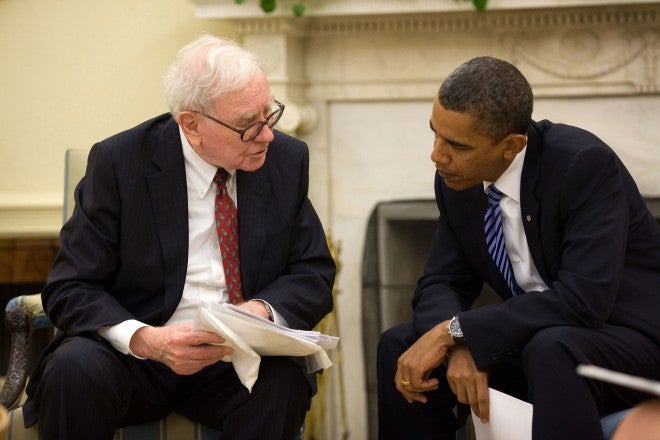Warren Buffett to Shareholders: World War III and the “Dark Side” of Innovation
Jon Stokes 02.29.16

Warren Buffett’s annual letter to Berkshire Hathaway’s shareholders is out, and as always it’s a must-read for everyone who wants to be informed about the state of the American economy.
One part in particular stands out in this year’s letter, because Buffett basically goes prepper on the shareholders and starts talking about mass-casualty terror attacks and WWIII.
There is, however, one clear, present and enduring danger to Berkshire against which Charlie and I are powerless. That threat to Berkshire is also the major threat our citizenry faces: a “successful” (as defined by the aggressor) cyber, biological, nuclear or chemical attack on the United States. That is a risk Berkshire shares with all of American business.
The probability of such mass destruction in any given year is likely very small. It’s been more than 70 years since I delivered a Washington Post newspaper headlining the fact that the United States had dropped the first atomic bomb. Subsequently, we’ve had a few close calls but avoided catastrophic destruction. We can thank our government – and luck! – for this result.
Nevertheless, what’s a small probability in a short period approaches certainty in the longer run. (If there is only one chance in thirty of an event occurring in a given year, the likelihood of it occurring at least once in a century is 96.6%.) The added bad news is that there will forever be people and organizations and perhaps even nations that would like to inflict maximum damage on our country. Their means of doing so have increased exponentially during my lifetime. “Innovation” has its dark side.
There is no way for American corporations or their investors to shed this risk. If an event occurs in the U.S. that leads to mass devastation, the value of all equity investments will almost certainly be decimated.
No one knows what “the day after” will look like. I think, however, that Einstein’s 1949 appraisal remains apt: “I know not with what weapons World War III will be fought, but World War IV will be fought with sticks and stones.”
I find it fascinating that Buffett chose to address this particular issue in this year’s letter. Mass casualty terror attacks have been a persistent threat for years, but he’s finally taking a crack at it, in sort of a non-sequitur way. The topic just crops up in a generic “risk management” section of the type that you typically see in such letters. One minute he’s talking about the uselessness of risk sections in other people’s annual reports, and the next he’s warning about WWIII.
I have a theory about what’s going on here: in a very subtle way, Buffett is weighing in on the current encryption dustup that has pitted Silicon Valley stalwarts Apple and Google against the national security state.
Indeed, Buffett himself basically confirmed this reading in a recent CNBC appearance, where he weighs in on the side of the FBI and against Apple, suggesting that “privacy has its limits” and that Apple should cooperate with the FBI.
What’s even more interesting is that Buffett goes on to say the following:
“I think, frankly, Apple would cooperate if it was a targeted sort of thing where they felt it was very important to national security. But I don’t think they want to unlock millions of phones,” he added. “You can’t call everything national security.”
This is interesting to me because, as a tech person, this quote tells me with absolute clarity that Buffett does not understand Apple’s position, at all.
Apple’s position is precisely that if it were to do what the FBI asked, it would be effectively unlocking millions of phones. The logic is that once a piece of software exists and gets out onto the Internet, there is no way to uncreate it. If Apple writes a single, on-off program to unlock an encrypted iPhone and hands it over to the federal government, then in order to keep those “millions of iPhones” safe from that program, the government would have to guarantee with absolute certainty that no unauthorized user could ever leak a copy. This is impossible.
Apple knows quite well that the Chinese would have this program within hours of it being created. And from there, it could go everywhere.
At any rate, Buffett clearly is not grasping what Cook is saying, which is that to merely create this program that the FBI has requested is to effectively unlock millions of phones.
Personally, I do not believe that Apple will be able to hold out against the government in the long run. At some point in the next two or three years, it will be obvious to everyone that you can either have some measure of personal privacy, or you can have a smartphone, but you cannot have both. The great majority of people will opt for the smartphone, and that will be that.